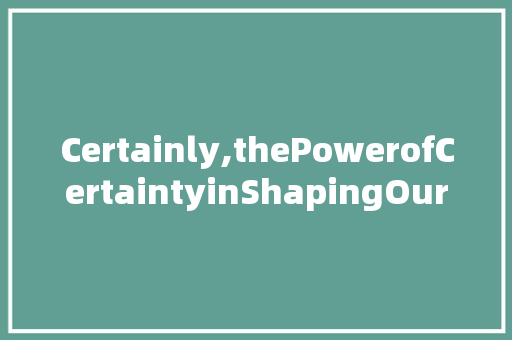Introduction:
In the ever-evolving world, certainty has always been a cornerstone of human existence. It provides us with a sense of security, direction, and purpose. Without certainty, our lives would be filled with uncertainty and doubt, making it challenging to make decisions and move forward. This article explores the significance of certainty, its impact on our lives, and how it shapes our reality.

I. Understanding Certainty:
A. Definition of Certainty:
Certainty refers to the state of being sure or confident about something. It involves a firm belief or knowledge that something is true, real, or definite.
B. Sources of Certainty:
1. Personal Knowledge: Certainty can arise from personal experiences, education, and expertise.
2. Authority: Trusting experts, authorities, or reliable sources can provide a sense of certainty.
3. Logic and Reasoning: Analyzing information and arriving at a conclusion based on logical reasoning can lead to certainty.
II. The Power of Certainty:
A. Certainty and Decision-Making:
Certainty plays a crucial role in decision-making. When we are certain about something, it becomes easier to make choices and take action. Uncertainty, on the other hand, can lead to hesitation, fear, and indecision.
B. Certainty and Confidence:
Certainty enhances our confidence in ourselves and our abilities. When we are certain about our skills, knowledge, and goals, we are more likely to pursue them with determination and perseverance.
C. Certainty and Happiness:
Certainty contributes to our overall well-being and happiness. When we are certain about our relationships, career, and future, we experience a sense of peace and contentment.
III. The Impact of Uncertainty:
A. Paralyzing Fear:
Uncertainty can lead to fear and anxiety, paralyzing us from taking action. It can hinder our personal growth and prevent us from achieving our full potential.
B. Negative Perception:
Uncertainty can distort our perception of reality, making us overly concerned about potential risks and negative outcomes. This can lead to pessimism and a lack of optimism.
C. Missed Opportunities:
Uncertainty can prevent us from seizing opportunities, as we may be hesitant to take risks or make decisions without being certain about the outcome.
IV. Cultivating Certainty:
A. Self-Reflection:
Engaging in self-reflection helps us gain clarity and certainty about our values, beliefs, and goals. It allows us to make informed decisions and move forward with confidence.
B. Education and Knowledge:
Acquiring knowledge and understanding various perspectives can enhance our certainty. By being well-informed, we can make more informed decisions and trust our judgments.
C. Trusting Intuition:
Learning to trust our intuition and inner voice can provide us with a sense of certainty. Sometimes, our gut feelings can guide us in making the right choices.
V. Conclusion:
Certainly, certainty plays a vital role in shaping our reality. It empowers us to make decisions, boosts our confidence, and contributes to our overall well-being. While uncertainty is an inevitable part of life, cultivating a sense of certainty can help us navigate through challenges and achieve our goals. By understanding the sources of certainty and developing strategies to cultivate it, we can create a more secure and fulfilling life.
References:
1. Kahneman, D. (2011). Thinking, Fast and Slow. New York: Farrar, Straus and Giroux.
2. Covey, S. R. (1989). The 7 Habits of Highly Effective People: Powerful Lessons in Personal Change. New York: Free Press.
3. Seligman, M. E. P. (2011). Flourish: A Visionary New Understanding of Happiness and Well-being. New York: Free Press.









